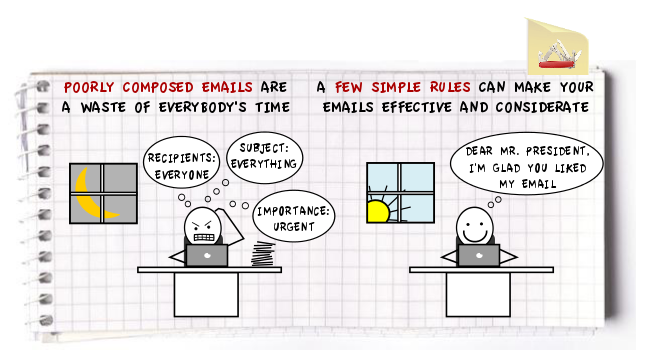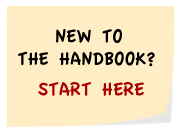Warning: file_get_contents(): php_network_getaddresses: getaddrinfo failed: Name or service not known in /www/htdocs/w00e5436/Handbook/wp-content/plugins/digg-digg/include/dd-class.php on line 1202
Warning: file_get_contents(http://feeds.delicious.com/v2/json/urlinfo/data?url=http%3A%2F%2Fhandbookofawesome.com%2F2012%2F03%2Fawesome-emails%2F): failed to open stream: php_network_getaddresses: getaddrinfo failed: Name or service not known in /www/htdocs/w00e5436/Handbook/wp-content/plugins/digg-digg/include/dd-class.php on line 1202
“I would have written a shorter letter, but I did not have the time.” (Blaise Pascal)

Like it or not, email has become one of the most important communication tools in our lives, both at home and especially at work. Pictures of kittens, videos of drunken escapades, chain-letters about blind, one-legged orphans tied to elephants and sometimes actually relevant messages can be sent with the touch of a button. According to the Radicati Group around 30 billion emails (plus, and this is not a joke, another 290 billion of spam) are sent every day. This can be a little overwhelming, and if you feel like you’re at the mercy of your inbox rather than in control of it, we suggest you read our article on good email use.
The fact that it has become ubiquitous so quickly means that proper email protocol is barely followed. If you spend most of your day reading and composing emails, this can quickly become infuriating, as most people won’t even pause for a second before clicking send. Some classic email-gaffes include:
- Forwarding a message or link accompanied with the note “FYI” or “You should read this”. In most cases this means the sender has felt the title of the document is peripherally related to what you are doing and for some reason thinks that they are being helpful by flogging whatever garbage they stumble upon onto you.
- CC’ing people whom the email does not concern at all for the purpose of “keeping them in the loop”. Often this is just an attempt to disseminate responsibility to a large group of people, but in reality it’s just a waste of everyone’s time.
- Marking everything urgent and/or overusing CAPITAL LETTERS AND EXCLAMATION MARKS!!! Avoid at all costs unless you’re trying to entice people to invest in your Nigerian oil-scam.
- Writing James Joyce stream-of-consciousness monologues in your message, hoping the reader will be able to parse together the fragments of your psychotic verbal-vomit.
- Using non-descriptive titles so that the recipient has to slog through the entire email to understand what you want.
But let’s say you’re writing an email with content other than “Look, what the internet gave me: a picture of a dog wearing a hat!” How should you compose it to maximize the impact while being considerate of the recipient? Here are the most important aspects you need to consider:
Who are you writing to? Who really needs this information and who should address it? Don’t CC people unless it’s vital that they partake in the conversation. Bombarding people with stuff they don’t need to read is not only inconsiderate, but will make it harder for you to get anyone’s attention when you actually do need to reach them (remember the boy who cried “wolf”).
What’s the subject of your message? This is by far the most important part of the entire email. At best, a poorly chosen subject-line is inconsiderate to the recipient since he or she will not know how to prioritize your message, and at worst it can mean your message goes completely unread.
- Ideally, the subject should already convey the most important message of your email, a bit like a top-level summary.
- Remember, only one topic per email. Rather than writing a long message with a throng of topics, send several short messages. Five short questions will likely get five short answers quickly, whereas a long, meandering enquiry will be put on a to do-list.
- Does your email require action from the recipients? Then start your topic with “Action required…“, so people know it can’t just be ignored.
What are you trying to say? Keep in mind that emails are not supposed to be built like mystery novels, where the reader has to be kept in suspense till the very end before finding out who did it. You want to give all your conclusions upfront. Use the pyramid principle to make your mails as impactful as possible.
- Keep your emails as brief as possible, some people even recommend a five-sentence limit. Often long emails are just a sign that the sender has not bothered to distill his or her thoughts into a coherent message, leaving it up to the reader to decipher the ramblings.
- If your message requires people to take action, express this clearly and individually to all the recipients, explaining what you want and when you need it, i.e. “John, I need your data by close-of-business today.”
- Always consider the possibility that someone may forward your message to new recipients. For this purpose, use lingo that can be understood by everyone, but more importantly, ensure your message is one you would not be ashamed of even if it leaked for the whole world to see. A counter-example would be describing your business strategy as a “blitzkrieg”.
Should you be sending an email? Emails can be a great tool for conveying information, but not for all purposes.
- If you need information urgently (within hours), then pick up the phone. Remember, emails are for non-urgent business only, and you can’t be pissed at someone if they take 24 hours to respond to a message, no matter how many exclamation marks you put in it.
- Are you upset? Then don’t write an email. Messages sent in the heat of the moment might make for fun reading when they’re circulating online, but are probably best contemplated for a day or so and then delivered in person or over the phone if still relevant. After all, that 5 AM message to your boss peppered with suggestions of multiple personality disorders and comparisons to various bodily fluids will be less amusing on Monday morning. If you want to express something emotional, use the phone or book a face-to-face meeting.
Following these few simple rules will hopefully generate the same amount of consideration from others when messaging you, and who knows, one day we might eradicate all crappy emails from the planet!
Speaking of well-formulated emails, would you like a weekly injection of awesome into your inbox? Just follow this link and enter your mail address, and you’ll automatically receive our newest article once a week.









